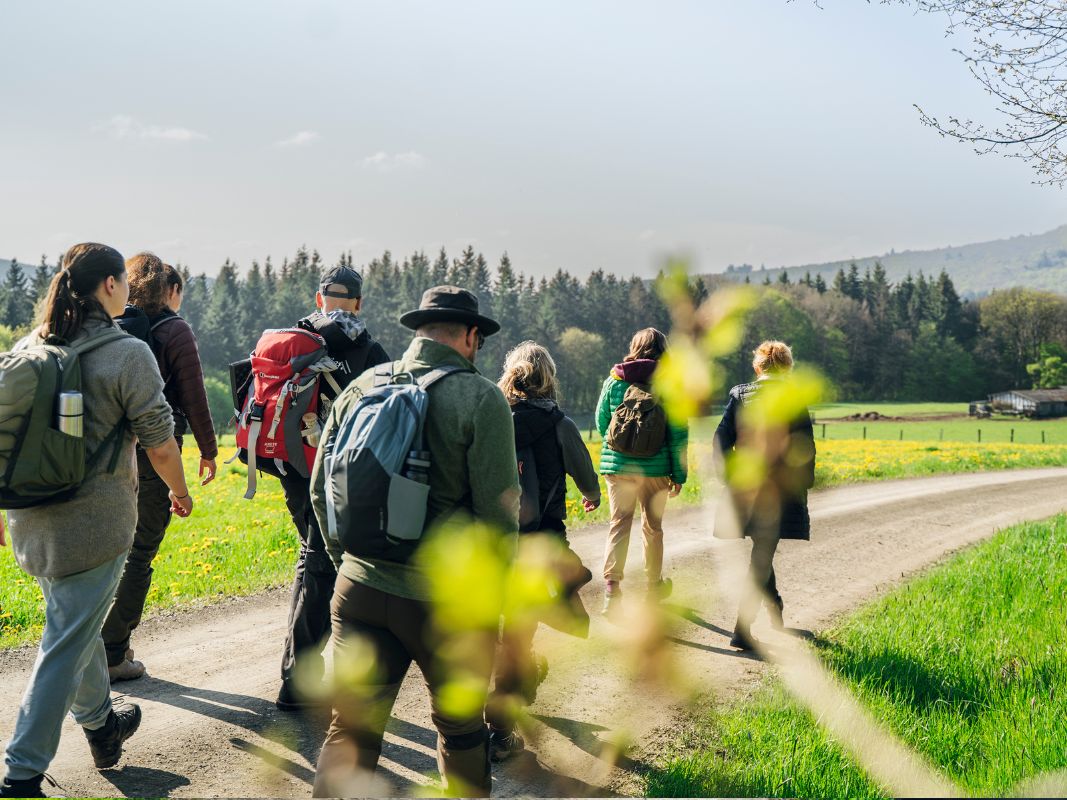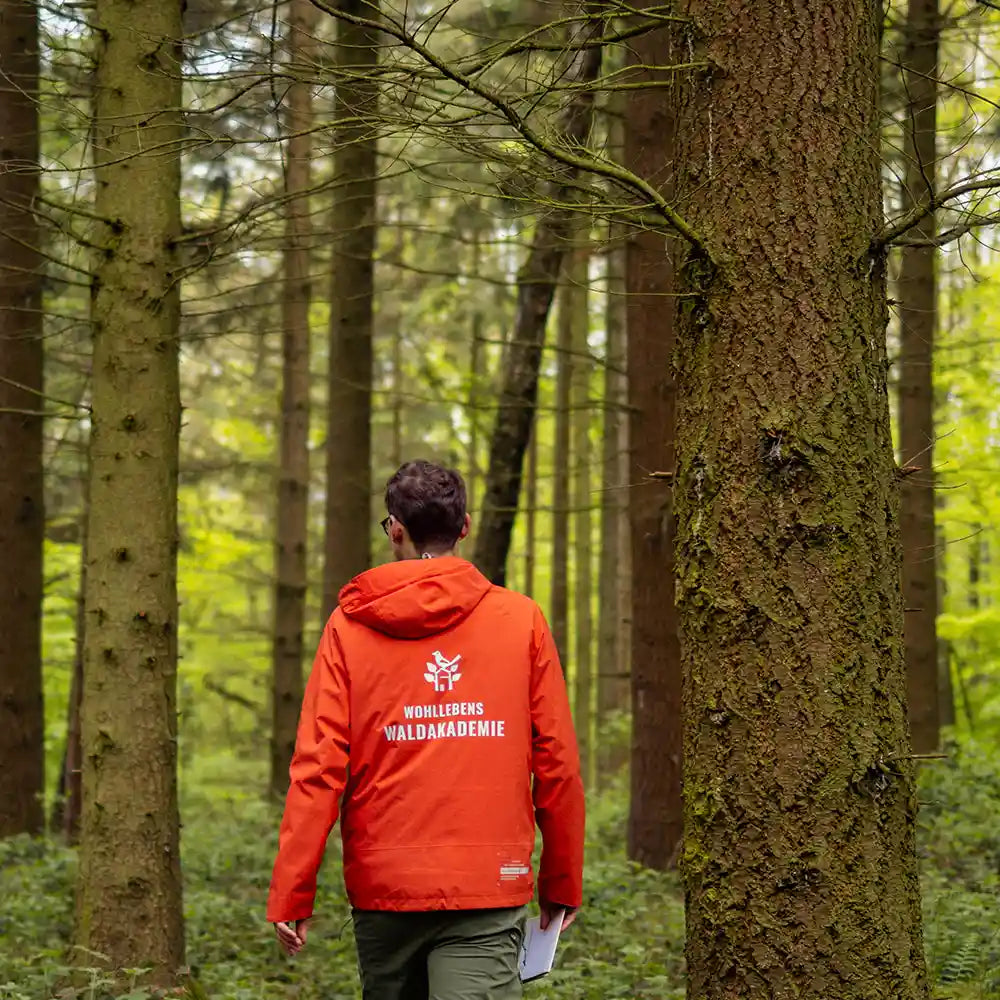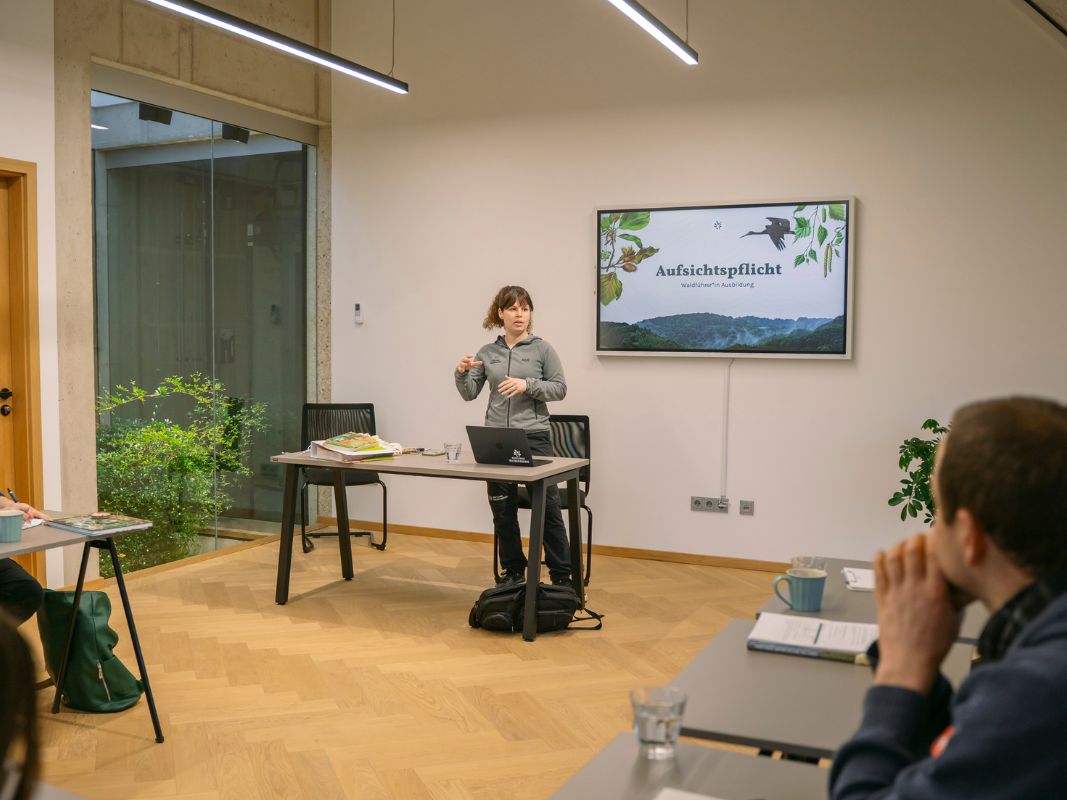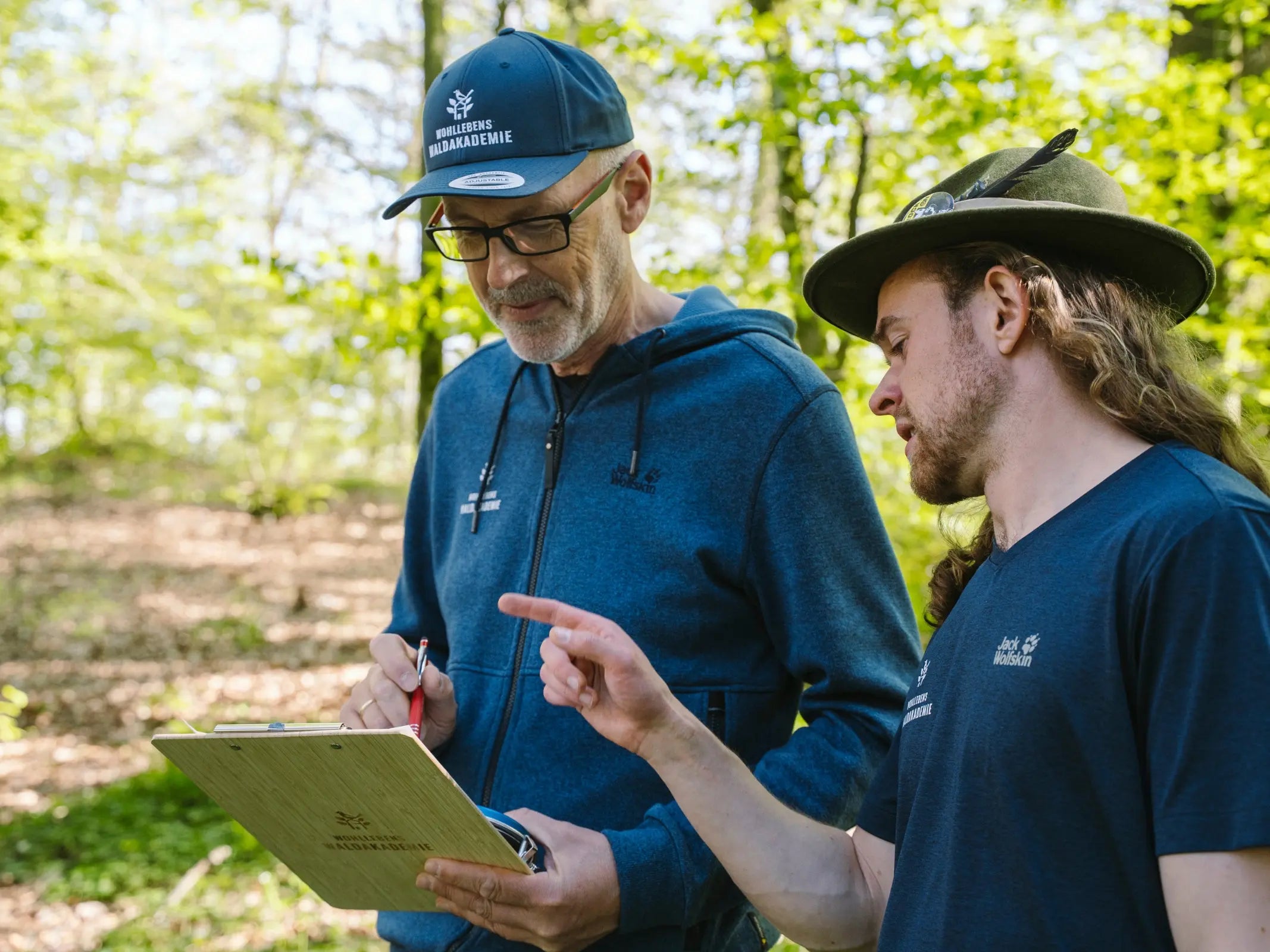Educational leave in the forest – further education with nature experience
Want to gain forest knowledge, spend time in nature with like-minded people, and make a positive contribution to protecting our forests – all while you're working? Educational leave gives you additional time to learn about nature and nature while continuing to receive your salary.

What is educational leave?
In most German states, educational leave is a legally enshrined right to paid leave for professional development . In addition to regular vacation, employees are entitled to five days per year or ten days of educational leave every two years . Your employer continues to pay your salary during this time; you only have to cover the course costs yourself. The training does not necessarily have to be job-related.

Who is entitled to educational leave?
As a rule, all employees, regardless of whether they are full-time or part-time, have a mini-job, work from home, or work from home, are entitled to educational leave, provided they work in a federal state that offers educational leave. The regulations for trainees vary from state to state. Company size can also lead to different regulations between states. Civil servants are not entitled to educational leave. In some federal states, however, it is possible to apply for recognition under civil service law .

Wer hat Anspruch auf Bildungsurlaub?
Egal, ob Vollzeit, Teilzeit, Minijob oder Home-Office: Wenn du in einem Bundesland mit Bildungsurlaub arbeitest, hast du in der Regel Anspruch. Ausnahmen gelten nur für Beamte, doch hier kann teilweise eine freiwillige Genehmigung beantragt werden. Auch für Auszubildende und kleine Betriebe gelten teils gesonderte Regeln. Wichtig: Entscheidend ist beim Bildungsurlaub nicht dein Wohnort, sondern wo du arbeitest.
Which Forest Academy events are recognized for educational leave?
Depending on the federal state, the forest guide training, the forest week, and the one-week intensive forest management seminar are recognized as educational leave . All other events are too short to qualify for educational leave.
The decisive factor for the application is the place where you work , not your place of residence.
Educational leave is not offered in Bavaria and Saxony , and unfortunately, we are currently unable to offer it (yet) in North Rhine-Westphalia and Baden-Württemberg. However, we have found that employers have been accommodating and have approved educational leave despite the lack of recognition.



Recognition in:
✅ Berlin*, ✅ Brandenburg, ✅ Hamburg*, ✅ Hesse, ✅ Lower Saxony, ✅ Rhineland-Palatinate, ✅ Saarland, ✅ Saxony-Anhalt, ✅ Schleswig-Holstein, ✅ Thuringia
* In Berlin & Hamburg the training is only recognized for employees who explicitly need it for their job .
Learn more about the trainingRecognition in: ✅ Berlin*, ✅ Brandenburg, ✅ Hesse, ✅ Lower Saxony, ✅ Rhineland-Palatinate, ✅ Saarland and ✅ Thuringia.
* In Berlin, the training is only recognized for employees who explicitly need it for their job .
Learn more about Forest WeekRecognition in: ✅ Brandenburg, ✅ Hesse, ✅ Lower Saxony, ✅ Rhineland-Palatinate, ✅ Saarland and ✅ Thuringia.
Recognition in other federal states will be applied for upon request.
Learn more about the seminarBildungsurlaub oder Bildungsfreistellung – gibt es einen Unterschied?
Ja – auch wenn beide Begriffe ähnlich klingen, meinen sie nicht dasselbe.
- Bildungsurlaub ist ein gesetzlich verankerter Anspruch in den meisten Bundesländern. Du hast dabei das Recht auf bezahlte Freistellung für anerkannte Weiterbildungen, unabhängig davon, ob sie direkt berufsbezogen sind. Die Regelungen unterscheiden sich je nach Bundesland, gelten aber in der Regel für Arbeitnehmerinnen und Arbeitnehmer in Vollzeit, Teilzeit oder Minijob.
- Bildungsfreistellung ist hingegen ein allgemeinerer Begriff, der häufig in Ländern wie Rheinland-Pfalz oder dem Saarland verwendet wird, dort heißt der gesetzlich geregelte Bildungsurlaub offiziell so. In anderen Fällen beschreibt Bildungsfreistellung aber auch eine freiwillige, individuell vereinbarte Freistellung durch den Arbeitgeber – etwa in Bundesländern ohne gesetzliche Bildungsurlaubsregelung.
Wenn du in einem dieser Bundesländer arbeitest, lohnt sich ein Gespräch mit deinem Arbeitgeber. Viele zeigen sich offen für Fortbildungen mit ökologischem und gesellschaftlichem Mehrwert – besonders, wenn du gut vorbereitet in die Planung gehst.
How can I apply for educational leave?
Educational leave is regulated by the laws of the federal states, and these laws vary from state to state. The requirements for the recognition of events, the duration of seminars, and the group of eligible individuals vary. For example, in small businesses, the entitlement to educational leave is often limited. We therefore recommend that you first check the requirements for your educational leave. You can find the relevant laws on your state's website.
If all requirements are met, you are welcome to talk to your employer and agree on whether and when you can apply for educational leave and then register for your desired course.
The request for leave of absence must be submitted to your employer in writing – at least four to ten weeks before the start of the event, depending on the federal state. To submit the application, you will need the state's approval, confirmation of the event registration, and the schedule. We will be happy to provide this information.
After successful participation, you will also receive a confirmation of your participation from us, which you must present to your employer.
Register now and enjoy your educational holiday in the Eifel
Ein Bildungsurlaub in der Waldakademie ist mehr als nur Weiterbildung. Du schärfst deinen Blick für ökologische Zusammenhänge, tauschst dich mit Gleichgesinnten aus und stärkst dein Bewusstsein für nachhaltiges Handeln – mitten in der Natur und fern vom Alltag.
Ob als Waldführer, in der Waldwoche oder beim Intensivseminar: du nimmst fundiertes Wissen, neue Perspektiven und echte Naturerfahrungen mit zurück in den Job – und in dein Leben.
Melde dich jetzt an und nutze deinen Bildungsurlaub für das, was wirklich zählt.
FAQ – Häufige Fragen rund um den Bildungsurlaub
Hier findest du Antworten auf die wichtigsten Fragen rund um Anspruch, Antragstellung und Ablauf deines Bildungsurlaubs in der Waldakademie.
Was ist Bildungsurlaub und wie funktioniert er?
Bildungsurlaub ist ein gesetzlich geregelter Zusatzurlaub für anerkannte Weiterbildungen. du bekommst bis zu fünf zusätzliche Urlaubstage pro Jahr, in denen du bei vollem Gehalt an einem Seminar teilnehmen kannst. Die Kurskosten trägst du selbst. Besonders beliebt: Weiterbildungen mit Naturbezug, wie sie die Waldakademie anbietet.
Wer darf Bildungsurlaub nehmen?
In der Regel haben alle Arbeitnehmerinnen und Arbeitnehmer Anspruch – egal ob du in Vollzeit, Teilzeit, im Minijob oder im Home-Office arbeitest. Voraussetzung ist, dass du in einem Bundesland mit Bildungsurlaubsgesetz beschäftigt bist. Für Auszubildende und Beamte gelten Sonderregelungen.
Welche Waldakademie Kurse sind als Bildungsurlaub anerkannt?
In der Waldakademie erfüllen drei Veranstaltungen die Voraussetzungen: die Waldwoche, die Ausbildung zum Waldführer und das Intensivseminar zur ökologischen Waldbewirtschaftung. Alle anderen Seminare sind zu kurz, um offiziell als Bildungsurlaub anerkannt zu werden.
Muss mein Arbeitgeber den Bildungsurlaub genehmigen?
Wenn dein Seminar offiziell anerkannt ist und du die Fristen einhältst, darf dein Arbeitgeber den Bildungsurlaub in der Regel nicht ablehnen. Allerdings kann er aus betrieblichen Gründen einen anderen Zeitraum vorschlagen – darum lohnt sich eine frühzeitige Planung.
Bekomme ich eine Teilnahmebescheinigung für das Seminar?
Ja, nach erfolgreicher Teilnahme erhältst du ein Zertifikat mit Angabe der Kursdauer und Inhalte. Dieses kannst du deinem Arbeitgeber als Nachweis für deinen Bildungsurlaub vorlegen.









